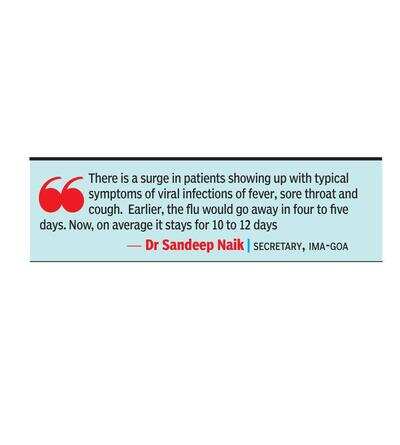Top Searches
State likely to see spike in prolonged flu cases: Docs

Panaji: Over the last one-month, Goa has witnessed a rise in cases of prolonged viral infections and coughs lasting for even 15 to 20 days for some. With Holi celebrations in full swing, there may be a further increase in infections, experts said.
“There is a surge in patients showing up with typical symptoms of viral infections of fever, sore throat and cough,” Indian Medical Association (IMA), Goa, secretary Dr Sandeep Naik said.
But the illness, Naik said, lasts for several days. Earlier, the flu would go away in four to five days.
“Now, on average it stays for 10 to 12 days,” he said.
Chest physician Dr Anil Mehndiratta said that the cause of these severe infections is not known. “We do not know if it is a H5N1 or H5N2 virus, but we are seeing a large number of cases and the rate of transmission is faster,” he said. With congregations happening due to Holi celebrations, more people are contracting the disease, Mehndiratta said.
Pulmonologist Dr Haradatt Karande said since January, he has noted an increase in such patients. “A lot of patients go into bronchitis after developing the infection, and some need to take two to three courses of antibiotics,” he said.
While no one has needed an intensive care unit (ICU) treatment, Karande said, a few patients did require to be hospitalised.
Recently, one of his patients, an 18-year-old girl, Karande said, was hospitalised as she was not responding to oral antibiotics. She recovered after hospital treatment.
For some time, he said, doctors treating such patients thought that the infections were caused by a Covid-19 variant. “We thought it was a milder variant of Omicron but it was not,” Karande said.
IMA Goa secretary said that people should not ignore their symptoms, especially those having pre-existing conditions such as heart disease, hypertension or diabetes.
“If symptoms do not show a sign of disappearing in two to three days, people with comorbidities should see a doctor,” he said.
But several people, Naik said, choose to treat themselves at home without consulting a doctor. They go to see a doctor only after all remedies have failed.
“Don’t self-medicate. When a doctor prescribes an antibiotic course, he does it for a reason but people should not start it on their own,” he said.
“There is a surge in patients showing up with typical symptoms of viral infections of fever, sore throat and cough,” Indian Medical Association (IMA), Goa, secretary Dr Sandeep Naik said.
But the illness, Naik said, lasts for several days. Earlier, the flu would go away in four to five days.
“Now, on average it stays for 10 to 12 days,” he said.
Chest physician Dr Anil Mehndiratta said that the cause of these severe infections is not known. “We do not know if it is a H5N1 or H5N2 virus, but we are seeing a large number of cases and the rate of transmission is faster,” he said. With congregations happening due to Holi celebrations, more people are contracting the disease, Mehndiratta said.
Pulmonologist Dr Haradatt Karande said since January, he has noted an increase in such patients. “A lot of patients go into bronchitis after developing the infection, and some need to take two to three courses of antibiotics,” he said.
While no one has needed an intensive care unit (ICU) treatment, Karande said, a few patients did require to be hospitalised.
Recently, one of his patients, an 18-year-old girl, Karande said, was hospitalised as she was not responding to oral antibiotics. She recovered after hospital treatment.
For some time, he said, doctors treating such patients thought that the infections were caused by a Covid-19 variant. “We thought it was a milder variant of Omicron but it was not,” Karande said.
IMA Goa secretary said that people should not ignore their symptoms, especially those having pre-existing conditions such as heart disease, hypertension or diabetes.
“If symptoms do not show a sign of disappearing in two to three days, people with comorbidities should see a doctor,” he said.
But several people, Naik said, choose to treat themselves at home without consulting a doctor. They go to see a doctor only after all remedies have failed.
“Don’t self-medicate. When a doctor prescribes an antibiotic course, he does it for a reason but people should not start it on their own,” he said.

About the Author
Bindiya ChariI'm a journalist with experience of more than a decade. I have covered politics, tourism, health and also done some off-beat stories. Apart from passion for journalism I have penchant for photography, trekking and travelling.
Start a Conversation
FOLLOW US ON SOCIAL MEDIA
FacebookTwitterInstagramKOO APPYOUTUBE









